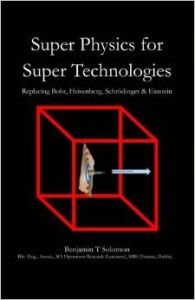Title: Super Physics for Super Technologies
Sub Title: Replacing Bohr, Heisenberg, Schrödinger & Einstein
Author: Benjamin T Solomon
Paperback: 154 pages
Publisher: Propulsion Physics, Inc. (March 19, 2015)
ISBN-10: 1508948011
ISBN-13: 978–1508948018
Language: English
Publisher’s Link: Super Physics for Super Technologies
Amazon’s Link: Super Physics for Super Technologies
Reviewer’s comments: “Benjamin is the second researcher I have met who has tried to consider a nonsingular cosmology. The first was Christi Stoica, which I met in 2010″.
Andrew Beckwith PhD
The Objective: This book, Super Physics for Super Technologies, proposes that a new physics exists. The findings are based on 16 years of extensive numerical modeling with empirical data, and therefore, both testable and irrefutable.
The Need: In 2012 Prof. Nemiroff, using Hubble photographs, showed that quantum foam cannot exists. In 2013, Solomon showed that both exotic matter and strings could not exists. In 2015 the Kavli Foundation, with Prof. Efstathiou, Prof. Pryke, Prof. Steinhard discussed the issues with the Planck Space Telescope findings of a Universe that is significantly simpler than our theories. Therefore the need for new physics.
The Benefits: The replacement of the Schrödinger wave function with a simpler probabilistic wave function, results in a new electron shell model based on the Rydberg equation, giving exact results with quantum mechanics; leading to a new Standard Model and the unification of photon shielding, transmission and invisibility as the same phenomenon. Solomon’s inference is that any current or future stealth technology can be neutralized.
The Possibilities: Is it possible to rewrite physics and the old great cherished masters? This work is based on extensive numerical modeling of known empirical data and theorizing. Therefore, the answer must be YES.
Acknowledgements: I would like to thank Lockheed for nominating me to the position of Committee Member, Nuclear and Future Flight Propulsion Technical Committee, American Institute of Aeronautics & Astronautics (AIAA)
